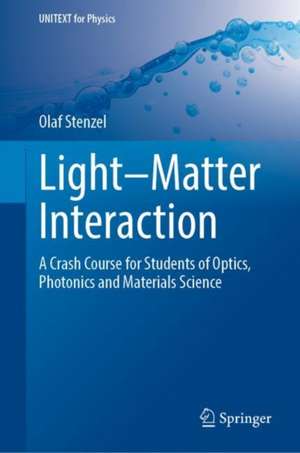Light–Matter Interaction: A Crash Course for Students of Optics, Photonics and Materials Science: UNITEXT for Physics
Autor Olaf Stenzelen Limba Engleză Hardback – 9 feb 2022
| Toate formatele și edițiile | Preț | Express |
|---|---|---|
| Paperback (1) | 507.05 lei 6-8 săpt. | |
| Springer International Publishing – 9 feb 2023 | 507.05 lei 6-8 săpt. | |
| Hardback (1) | 604.23 lei 6-8 săpt. | |
| Springer International Publishing – 9 feb 2022 | 604.23 lei 6-8 săpt. |
Din seria UNITEXT for Physics
- 13%
 Preț: 355.10 lei
Preț: 355.10 lei - 17%
 Preț: 493.74 lei
Preț: 493.74 lei -
 Preț: 426.23 lei
Preț: 426.23 lei - 15%
 Preț: 582.95 lei
Preț: 582.95 lei -
 Preț: 460.30 lei
Preț: 460.30 lei - 17%
 Preț: 395.01 lei
Preț: 395.01 lei - 15%
 Preț: 603.83 lei
Preț: 603.83 lei -
 Preț: 357.86 lei
Preț: 357.86 lei -
 Preț: 358.00 lei
Preț: 358.00 lei - 15%
 Preț: 534.17 lei
Preț: 534.17 lei -
 Preț: 489.87 lei
Preț: 489.87 lei -
 Preț: 351.06 lei
Preț: 351.06 lei -
 Preț: 358.20 lei
Preț: 358.20 lei - 17%
 Preț: 362.51 lei
Preț: 362.51 lei - 17%
 Preț: 368.41 lei
Preț: 368.41 lei - 17%
 Preț: 395.64 lei
Preț: 395.64 lei -
 Preț: 458.61 lei
Preț: 458.61 lei - 15%
 Preț: 474.31 lei
Preț: 474.31 lei -
 Preț: 456.66 lei
Preț: 456.66 lei -
 Preț: 404.13 lei
Preț: 404.13 lei -
 Preț: 327.48 lei
Preț: 327.48 lei -
 Preț: 453.39 lei
Preț: 453.39 lei -
 Preț: 491.21 lei
Preț: 491.21 lei - 18%
 Preț: 796.13 lei
Preț: 796.13 lei -
 Preț: 828.92 lei
Preț: 828.92 lei -
 Preț: 724.07 lei
Preț: 724.07 lei -
 Preț: 489.30 lei
Preț: 489.30 lei - 15%
 Preț: 509.74 lei
Preț: 509.74 lei - 15%
 Preț: 528.63 lei
Preț: 528.63 lei - 15%
 Preț: 511.05 lei
Preț: 511.05 lei - 15%
 Preț: 499.77 lei
Preț: 499.77 lei - 15%
 Preț: 597.20 lei
Preț: 597.20 lei - 15%
 Preț: 782.69 lei
Preț: 782.69 lei - 15%
 Preț: 667.20 lei
Preț: 667.20 lei -
 Preț: 351.06 lei
Preț: 351.06 lei -
 Preț: 387.96 lei
Preț: 387.96 lei -
 Preț: 395.85 lei
Preț: 395.85 lei -
 Preț: 338.43 lei
Preț: 338.43 lei -
 Preț: 399.88 lei
Preț: 399.88 lei - 15%
 Preț: 543.67 lei
Preț: 543.67 lei
Preț: 604.23 lei
Preț vechi: 710.86 lei
-15% Nou
Puncte Express: 906
Preț estimativ în valută:
115.62€ • 121.02$ • 96.23£
115.62€ • 121.02$ • 96.23£
Carte tipărită la comandă
Livrare economică 01-15 aprilie
Preluare comenzi: 021 569.72.76
Specificații
ISBN-13: 9783030871437
ISBN-10: 3030871436
Pagini: 548
Ilustrații: XXVII, 548 p. 169 illus., 158 illus. in color.
Dimensiuni: 155 x 235 mm
Greutate: 0.98 kg
Ediția:1st ed. 2022
Editura: Springer International Publishing
Colecția Springer
Seria UNITEXT for Physics
Locul publicării:Cham, Switzerland
ISBN-10: 3030871436
Pagini: 548
Ilustrații: XXVII, 548 p. 169 illus., 158 illus. in color.
Dimensiuni: 155 x 235 mm
Greutate: 0.98 kg
Ediția:1st ed. 2022
Editura: Springer International Publishing
Colecția Springer
Seria UNITEXT for Physics
Locul publicării:Cham, Switzerland
Cuprins
Introduction.- Simplest Model Treatment of the Classical Interaction of Light with Matter.- Waves as Particles and Particles as Waves.- The Schrödinger Equation and Model System I.- Operators in Quantum Mechanics and Model System II.- Einstein-Coefficients and Quantum Transitions.- Planck’s Formula and Einstein-Coefficients.
Notă biografică
Olaf Stenzel received his Diplom in Physics in 1986 from Moscow State University and his doctoral degree (Dr. rer. nat.) in 1990 from the Chemnitz University of Technology, Germany. In 1999 he earned his Habilitation (Dr. habil.) and, in 2001, joined the Optical Coating Department at the Fraunhofer Institute of Applied Optics and Precision Engineering in Jena, Germany. He regularly gives master-level lectures at the Friedrich Schiller University in Jena on thin-film optics and the structure of matter. He has authored and co-authored more than 100 peer-reviewed scientific papers and 4 books.
Textul de pe ultima copertă
This book offers a didactic introduction to light–matter interactions at both the classical and semi-classical levels. Pursuing an approach that describes the essential physics behind the functionality of any optical element, it acquaints students with the broad areas of optics and photonics. Its rigorous, bottom-up approach to the subject, using model systems ranging from individual atoms and simple molecules to crystalline and amorphous solids, gradually builds up the reader’s familiarity and confidence with the subject matter. Throughout the book, the detailed mathematical treatment and examples of practical applications are accompanied by problems with worked-out solutions. In short, the book provides the most essential information for any graduate or advanced undergraduate student wishing to begin their course of study in the field of photonics, or to brush up on important concepts prior to an examination.
Caracteristici
Uses a rigorous, bottom-up approach to describe the fundamental concepts of light–matter interactions Provides a detailed mathematical treatment, combined with heuristic and intuitive approaches to more advanced problems Uniquely interdisciplinary focus, combining optics, quantum mechanics, electrodynamics, and solid-state physics
